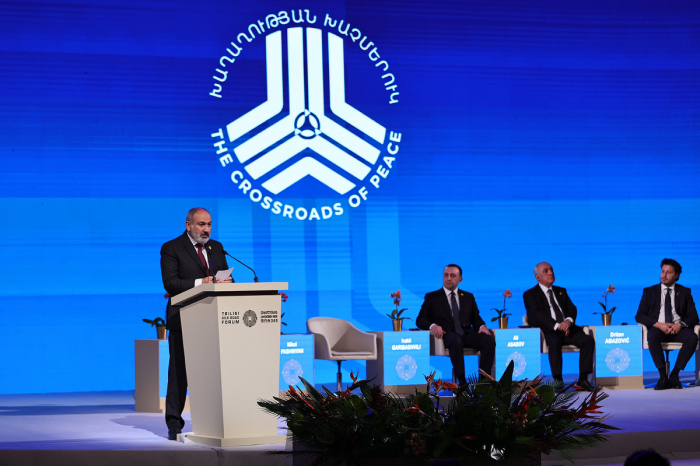On April 5, European Commission President Ursula von der Leyen and US Secretary of State Antony Blinken expressed support for the “Crossroads for Peace” project of Armenian Prime Minister Nikol Pashinyan during a press conference before their meeting in Brussels (US Department of State, April 5). The project, which was presented to the public during the Armenian premier’s address at the Fourth Silk Road Forum in Tbilisi on October 26, 2023, envisions opening new transportation routes across Armenia with the hopes of transforming the country into a regional transit hub (Hetq.am, October 26, 2023, Primeminister.am, accessed April 15). The project calls for the opening of connections between Azerbaijan and Türkiye via Armenian territory and aims to incorporate these links into east-west trade along the Middle Corridor. Neither Baku nor Ankara, however, has been consulted or declared any support for the initiative. Thus, Pashinyan’s project remains “on paper,” and failure to work directly with the Azerbaijan and Turkish governments may mean the idea never comes to fruition.
Baku and Ankara view Crossroads for Peace as Pashinyan’s counterproposal to the Zangezur Corridor initiative championed by Azerbaijan. Opening of the Zangezur Corridor was discussed and partly agreed upon in the November 2020 trilateral statement between Armenia, Azerbaijan, and Russia ending the Second Karabakh War. The plan was subsequently discussed during summits between the leaders of Armenia and Azerbaijan via the mediation of Russia and the European Union in 2021 and 2022, respectively (Aircenter.az, accessed April 15). A day after the Brussels summit on May 22, 2022, Azerbaijani President Ilham Aliyev told his Turkish counterpart, Tayyip Recep Erdogan, that Baku and Yerevan had agreed on opening the Zangezur Corridor and constructing new railways and highways (Arminfo.info, May 24, 2022). The situation has changed with two mutually exclusive projects now on the table.
Several key differences set the two projects apart. First, the Zangezur Corridor envisioned the reopening of the Soviet-era railway and highway connections between the western part of mainland Azerbaijan and its Nakhchivan exclave via Armenia’s Syunik province. While Crossroads for Peace includes a railway link running along this passage, it favors alternative routes for the motorway connection. Azerbaijan, having almost completed construction of the highway along its section of the corridor, rejects Yerevan’s proposal to open highway links in other areas without opening it along the Zangezur route (Trtafrica.com, January 10). In January, Aliyev emphasized that, if the Zangezur Corridor “is not opened, we are not going to open our border with Armenia anywhere else” (Azertag.az, January 10).
Second, Azerbaijan expects Armenia to deploy personnel of the Russian Federal Security Service’s (FSB) Border Guard Service to exercise “control over transport” as envisioned in the November 2020 trilateral statement (President.az, November 10, 2020). Yerevan argues that this statement is no longer relevant as Russia and Azerbaijan have violated other provisions of the agreement (Ilurer.am, February 19). This element of Crossroads of Peace seems to be the key reason undergirding Western support for the project. The possible deployment of Russia’s FSB along the route appears to be at odds with the West’s interests in the South Caucasus.
Third, Baku and Yerevan disagree on the regulations that will be applied to the transportation passage between mainland Azerbaijan and Nakhchivan. The Azerbaijani government expects Armenia to provide “unimpeded” passage through the Zangezur Corridor as outlined in the November 2020 agreement. This would mean no customs duties, border checks, or border security for cargo and passengers traveling from the western parts of Azerbaijan to Nakhchivan. Goods and people destined for other countries would still be subject to these measures (Azertag.az, January 4). Baku has pointed to Russia’s Kaliningrad as a possible model for such an arrangement. Crossroads for Peace does not include any proposal for providing passage without customs duties and border/security checks (Turan.az, January 5).
Moscow advocates for customs and border checks along the route, with operations conducted by Russian personnel (see EDM, January 24). The Kremlin insists on the trilateral statements of 2020 and 2021 as the basis for any regional negotiations on transportation corridors. However, the last time the trilateral working group established to carry out these negotiations and produce proposals convened was June 2, 2023 (see EDM, January 12, 2021). The group has not met since, though Moscow has at times invited the parties to resume this format on several occasions (News.am, March 27).
Complications stemming from fundamental disagreements between the two sides have minimized the chances for the implementation of transportation projects between Armenia and Azerbaijan in the near term. According to Farid Shafiyev, chairman of the Baku-based Center of Analysis of International Relations, Crossroads for Peace is an “empty declaration” since the establishment of links across the territories of Armenia does not make sense without Azerbaijan’s participation. He added that the railway connection between Armenia and Iran is economically possible only through Azerbaijan’s Julfa [district] in Nakhchivan. Armenia’s eastward routes go through Azerbaijan and its westward ones through Türkiye—and that link is also conditional on opening transport links with Azerbaijan” (Aircenter.az, accessed April 15).
The Azerbaijani government argues that the Armenian government’s pursuit of Crossroads for Peace is inefficient and would ultimately leave Armenia isolated if Yerevan refuses to open the Zangezur Corridor (Trend.az, March 2). Azerbaijan and Türkiye hope to complete all construction along the Zangezur route by 2028 (Azernews.az, February 19). Meanwhile, Baku and Ankara are completing work on the trans-Iranian Aras Corridor, where construction began in October 2023 (See EDM, January 10). Additionally, significant progress has been made in expanding the capacity of the Baku–Tbilisi–Kars railway by five-fold to 5 million tons annually, further diminishing Azerbaijan’s reliance on a trans-Armenian route (Caliber.az, March 5). Given these alternatives, it is clear that Crossroads for Peace is not currently on Azerbaijan’s or Türkiye’s agenda and is unlikely to be feasible in the near future.
AzVision.az
AzVision.az
More about:
















































